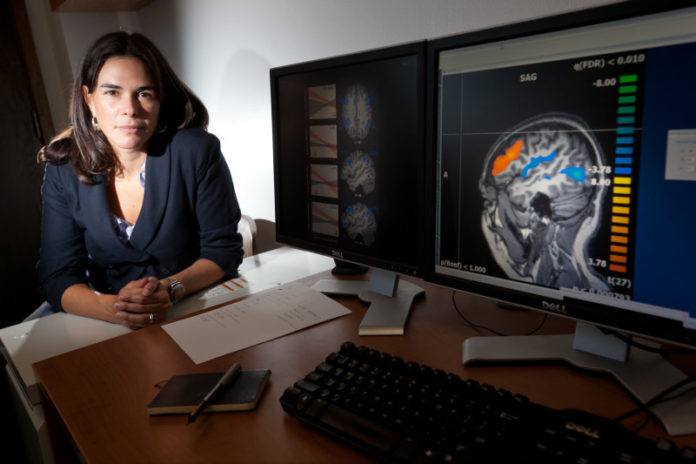
We usually think our mind is in control and telling our body what to do. But there is a lot of scientific evidence that shows the chatter between mind and body goes two ways, and the body is an integral part of how we think. In the new book How the Body Knows Its Mind, Prof. Sian Beilock provides the latest scientific evidence about the body’s influence on our psyche, drawing on work from her own laboratory and from colleagues around the world.
Beilock, a leading expert on the brain science behind human performance, believes the body-mind connection starts early.
“Movement matters with everyone, but it is especially important for babies and young children,” said Beilock. “Mobile kids hit cognitive milestones faster.” She said that simple steps like allowing babies to run around naked — when appropriate — can help them explore their worlds. Beilock said wearing diapers and using baby walkers can limit a baby’s ability to interact with the world and hinder the process of learning how to walk. The more quickly children learn how to walk and explore, the faster their cognitive development.
Incorporating physical activity into more subjects can help kids learn in school, according to Beilock.
“We can’t just keep students confined to their chairs — we have to get them up, out and moving,” Beilock said. “When the subjects are math or physics, getting students to actually physically experience some of the concepts they’re learning about changes how their brains process the information and can lead to better performance on a test.” Movement also helps explain the connection between music and math. Why do kids tend to excel in both? It’s because the brain areas controlling finger dexterity and number largely overlap. Beilock unpacks the latest research showing that when kids exercise their fingers through regular piano play, their grasp of numbers improves.
Exercise can aid mental health as well as academic achievement, according to Beilock. “The research shows that getting kids moving is important not only for their physical well-being, but for their mental well-being, too.” She said schools need to emphasize “the “4 Rs” — reading, (w)riting, (a)rithmetic and recess. Boys’ academic achievement may especially benefit from recess, she added.
Exercise is equally important for older adults, as it can promote healthy aging mentally and physically. “There are clear differences in brain health in fit, older adults compared with their more sedentary counterparts,” said Beilock. “And these differences carry consequences for thinking and reasoning as well as for memory.” Beilock stressed that aerobic exercise, which can alter the structure and functioning of the brain, is key for improving mental health. Activities like swimming, running, cycling, walking briskly or even doing household chores at a vigorous pace can benefit the brain, in addition to keeping the body fit.
How the Body Knows Its Mind provides many tips on how to use one’s body, actions or surroundings to stimulate the mind and to influence those around you. She offered a few suggestions to improve the body-mind connection:
• Take active breaks from work or vexing problems to give your brain a chance to regroup and reboot. Physically walking away from the problem for a few minutes may help you solve it. • Your body’s posture and expressions are not just reflections of your mind — they can influence your mood. Stand tall to help give yourself confidence and to send a signal to those around you that you have brought your “A” game to the table. And be mindful of your facial expressions. Your brain uses your expressions as cues to feel emotions. Smiling can actually make you feel happier. • Practice in the real conditions under which you will have to perform — whether it’s public speaking, a test or an important match. It’s also good to practice in front of others so when all eyes are on you, it’s nothing new. • Write it out. Journaling can help you deal with the stress of a test or your worries in daily life. Physically downloading worries from your mind (by putting pen to paper) has positive performance outcomes and reducing that stress affects your health in good ways, too. • Spend time in nature as often as you can, and find time to meditate. New science shows that a walk in the woods rejuvenates our minds and improves our ability to pay attention and focus. Meditation for even a few minutes a day can help alleviate anxiety and chronic pain. It also can help with self-control that may be helpful for working to break bad habits, like smoking.
“Little things we do can have a big effect,” said Beilock. “The idea of the book is that if we can understand the science behind how the body affects the brain, we will be in a great position to ensure that we’re always putting our best foot forward when it matters the most.”
Story Source:
The above story is based on materials provided by University of Chicago. Note: Materials may be edited for content and length.
